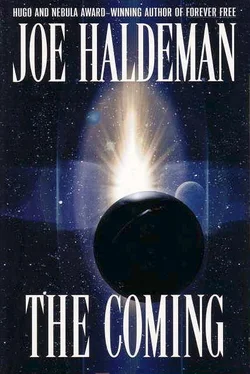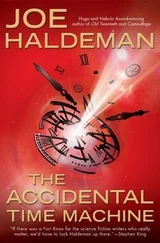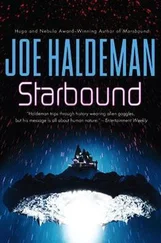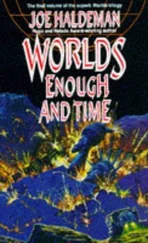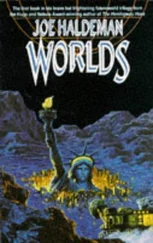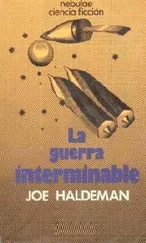The bartender had waited for him to come out. He cracked the tap slowly and filled a frosted mug. “Y’know, I got a memory for faces. You ain’t been in here before, but I seen you someplace.”
“That’s not surprising. I’ve lived around Gainesville for forty years.” The beer was a new kind, bland but with a little catnip bite. Ice-cold, though, and welcome. “Good. Norman Bell. I’m a music teacher and musician.”
“Sí, sí. I’ve seen you on the cube with your wife, Professor Bell. What you make of all this stuff?”
“Well, I sort of have to go along with the wife. Preserve domestic tranquillity.”
He laughed. “I hear ya.”
“She makes a good case, though. New Year’s Day is going to be interesting.”
“Little green men on the White House lawn?”
“Probably something even weirder than that. Something we can’t even imagine.”
The bartender poured himself a small glass of beer. “Yeah, I was reading… like why don’t they send a picture? They afraid of what we’d do?”
“What my wife says, they have no reason to be afraid of us for anything. They could fry the planet if we made a threatening move.”
“Jesus.”
“But there are any number of innocent explanations. Maybe they don’t send pictures because there’s nobody aboard; it’s just a robot that’s programmed to wander around, listening for radio waves. That’s what Rory thinks. My wife.”
“That was in the article. Also maybe they’re like invisible. Made of energy.”
I’ve had students like that, Norman thought. “I don’t think there’s anything mysterious about it. They know a lot about us, evidently, and don’t want us to know too much about them. That’s what a military operation would do.”
“So we can kiss our ass adios.”
“Not necessarily. We don’t know anything about their psychology. They might be following some kind of a ritual. Or keeping us in suspense as a kind of joke. Who knows?”
“Yeah, I guess.” He wiped the bar slowly. “You do any gettin’ ready for it?”
“You mean emergency preparations?” He shrugged. “Just what we have on hand for hurricanes. Plenty of water and food. I’m more worried about people panicking than aliens.”
“Me, too. You ought to go down to the pawnshop and get a gun.”
Norman jumped. “¿Cómo?”
“What I did. Somethin’ a guy at the bar said. “Ammunition will get you through times of no food, but food won’t get you through times of no ammo.’ The guys with him thought that was muy chistoso. Then one of them whispered something and they looked at me and laughed again. Them’s the kind I went out and got the gun for.”
“Claro. You must have some rough customers here.” Norman nodded toward the bathroom. “Looks like you had a big fight back there last night.”
“Oh, mierda. They bust it up?”
“No, just blood.”
He nodded philosophically and picked up a bucket. “’Scuse me.”
Norman finished his beer and pondered leaving a tip. No; the guy didn’t need any more surprises this morning.
Back in the sunlight, he clipped his bag to the handlebars and looked down, out of the glare: a storm drain. There was nobody in sight, so in a quick motion he pulled out the box of ammo and tossed it into the drain.
It was as if a weight had been lifted from him. Odd. He supposed the act confirmed that the gun’s function was purely defensive.
He checked his watch. Twenty minutes, and the restaurant was ten minutes away at a slow pace. Do you show up early for a blackmail lunch, or late, or on time? He decided on time would be best, and took a detour down by the student ghetto, a part of it that still had trees and shade.
This was where Qabil had lived when they met. He’d gone to his apartment a couple of times, though the house was less risky. Unless your wife came home early.
Alice’s Tea Room probably had its share of clandestine meetings. The only expensive restaurant in a block of student eateries, it had what they used to call a “shotgun” shape, a long rectangle with one row of tables.
They were at the farthest table, and the two nearest them were empty, with “Reserved” signs. Otherwise the restaurant was full.
The maître d’ approached and Norman pointed. “Joining that party.”
The walls were decorated with mediocre-to-okay paintings by local artists. It occurred to Norman that this was an odd choice for a supposedly clandestine meeting. If the bartender at that pool hall had recognized him on sight, what were the chances no one here would?
Pretty good, actually. The bartender was a fluke; besides his students and the Hermanos crowd, there weren’t too many people in town who would know him.
The lawyer, if that’s what he was, and Willy Joe and another man, a small skinny weasel with a sallow complexion, watched him as he walked down the aisle. He sat down wordlessly.
The sallow man thrust out a hand. “The bag.” Norman slid it over. “I smell gun oil.”
Norman tried to keep a neutral expression while the bodyguard, if that’s what he was, zipped open the bike bag and sorted through its contents. “It’s valve oil you smell, genius. I’m a musician. I was cleaning a trumpet.” They might know something about his sex life, but he doubted they knew which instruments he played. Definitely not trumpet.
“It’s okay, Solo,” Willy Joe said. “Professor wouldn’t bring a gun in here.” The man zipped up the bag slowly, staring.
He slid it across slowly. “What outfit you with?”
“What?”
“You’ve killed people, maybe lots.” He was almost whispering. “It’s in the way you walk, the way you’re not afraid. So you were a soldier?”
This man was dangerous, “Hundred and first. Second of the Twenty-third. But that was a long time ago.”
“You killed men, Professor?” Willy Joe said conversationally. “As well as fucking them?”
Interesting that he didn’t know that elementary fact. “As I said, a long time ago, both.”
The lawyer leaned forward, and he did whisper: “There’s no statute of limitations on being a faggot.”
Norman felt heat and a prickling sensation on his palms, the back of his neck, his scalp. Adrenaline, epinephrine. He knew his face was flushed.
If they hadn’t been in a crowded restaurant, at this moment he might find out how many of them he could kill before he died. Certainly one.
“There ain’t no need to be insulting, Greg,” Willy Joe said. “Let’s not use that word.”
“I apologize,” he said. “This is a financial proposition, not a moral judgment.”
Norman sat completely still. “Go on.”
“We know that your wife knows,” the lawyer said. “She paid off the police.” He looked up as a waiter approached.
“My name is Bradley,” he said. “For today’s specials, we—”
“I want the special,” Willy Joe interrupted. “We all want the special.”
“But we have four—”
“We want the first.”
“The grouper?”
“Yeah. What kinda wine goes with that?”
“I would suggest the Bin 24, the—”
“Bring us two bottles of it. Pronto?”
“Yes, sir.” He hurried away.
“You was sayin’, Greg.”
The lawyer paused, staring at Norman. “To be blunt, it’s your wife’s money we’re after. Her inheritance.”
“We have a joint account.”
“We know that, of course. But your wife seems to have enough on her mind right now. So we thought we’d approach you instead.”
“She’d lose her job,” Willy Joe said. “Even if she didn’t go to jail, for buying off the cops. And you and your boyfriend would get Raiford for sodomy. Separate cells, I think.”
“You might live through it,” the lawyer said, “but he wouldn’t. A fag… a homosexual cop in Raiford.”
Читать дальше
